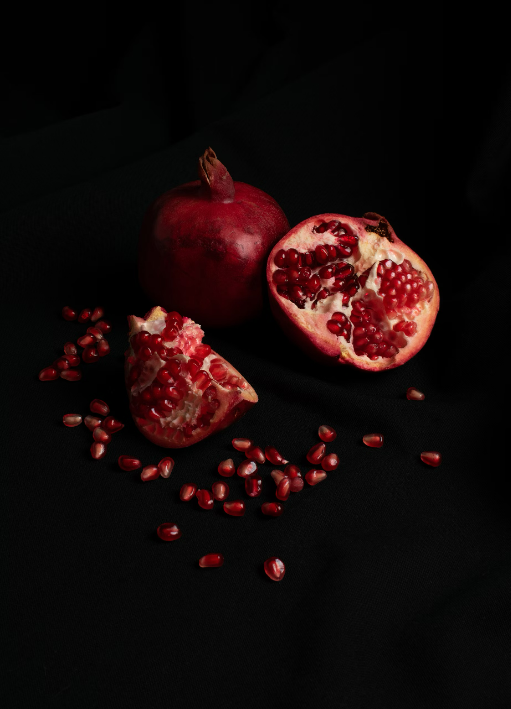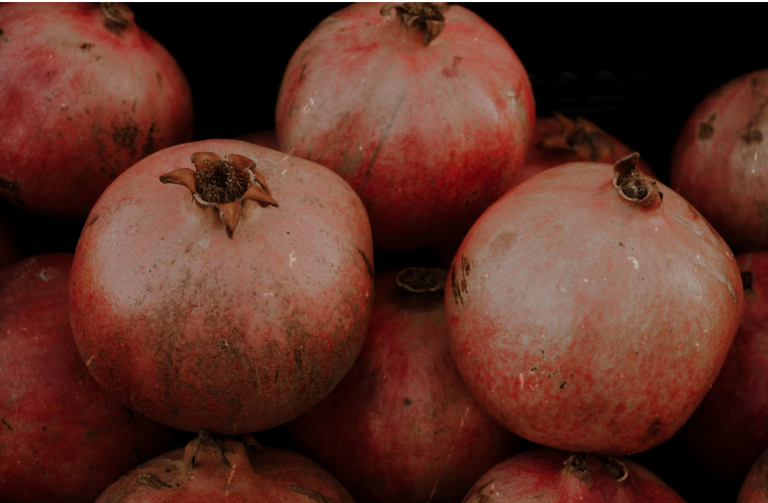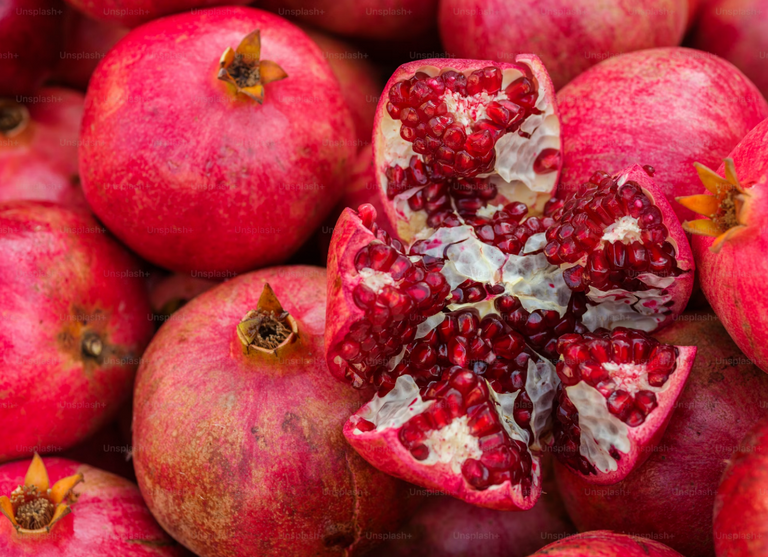Pomegranate, known as the "jewel of winter," is a fruit packed with antioxidants, vitamins, and minerals. Revered for its health benefits for centuries, it has been used in traditional medicine and celebrated for its unique, tangy-sweet taste. Here’s a detailed look at why pomegranate deserves a spot in your diet.
Nutritional Profile of Pomegranate (Per 1 Cup, Arils Only)
- Calories: 144
- Protein: 2g
- Carbohydrates: 32g
- Fiber: 7g
- Vitamin C: 30% of the daily value (DV)
- Vitamin K: 36% of the DV
- Folate: 16% of the DV
- Potassium: 12% of the DV
- Antioxidants: High in polyphenols like punicalagins and anthocyanins.
Health Benefits of Pomegranate
1. Rich in Antioxidants
- Why It Helps: Pomegranate seeds and juice are loaded with antioxidants that combat oxidative stress and free radicals, reducing the risk of chronic diseases.
- Key Compounds: Punicalagins, one of the most powerful plant-based antioxidants.
- How to Use: Drink freshly squeezed pomegranate juice to maximize antioxidant intake.
2. Supports Heart Health
- Why It Helps: Pomegranate may reduce bad cholesterol (LDL), improve good cholesterol (HDL), and lower blood pressure.
- Research Evidence: Studies have shown that regular consumption of pomegranate juice can improve blood flow and prevent arterial stiffness.
- How to Use: Add pomegranate seeds to salads or smoothies for a heart-healthy boost.
3. Promotes Healthy Digestion
- Why It Helps: Pomegranate is a great source of dietary fiber, which aids digestion and promotes a healthy gut microbiome.
- How to Use: Snack on raw pomegranate arils to improve digestive health.
4. Boosts Immunity
- Why It Helps: High levels of vitamin C and other antioxidants in pomegranate strengthen the immune system and help fight off infections.
- How to Use: Include pomegranate juice in your daily routine during cold and flu season.
5. Anti-Inflammatory Properties
- Why It Helps: The anti-inflammatory compounds in pomegranate help reduce inflammation, which is linked to arthritis, diabetes, and other chronic conditions.
- How to Use: Consume pomegranate regularly to manage inflammation naturally.
6. Enhances Skin Health
- Why It Helps: Pomegranate's antioxidants protect the skin from UV damage, prevent wrinkles, and promote a youthful glow.
- How to Use: Apply pomegranate seed oil topically or consume the fruit for internal benefits.
7. Supports Brain Health
- Why It Helps: The antioxidants in pomegranate may protect against neurodegenerative diseases and improve memory.
- Research Evidence: Some studies suggest pomegranate juice could delay the onset of Alzheimer's and other forms of dementia.
- How to Use: Drink pomegranate juice regularly to support cognitive health.
8. Aids in Cancer Prevention
- Why It Helps: Pomegranate contains plant compounds that may inhibit the growth of cancer cells, particularly in breast and prostate cancer.
- Research Evidence: Studies have shown promising results in reducing cancer cell growth and inducing apoptosis (cell death) in lab experiments.
- How to Use: Incorporate pomegranate seeds or juice into a balanced diet as a preventative measure.
9. Improves Athletic Performance
- Why It Helps: Pomegranate’s nitrates can enhance blood flow and reduce soreness, boosting endurance and recovery.
- How to Use: Drink pomegranate juice before or after workouts for better performance and quicker recovery.
10. Promotes Weight Management
- Why It Helps: Low in calories but high in fiber, pomegranate keeps you full longer and reduces unhealthy cravings.
- How to Use: Add pomegranate to your meals or as a snack to support weight loss efforts.
How to Incorporate Pomegranate Into Your Diet
- Fresh Arils: Eat them raw as a snack.
- Juice: Blend and strain fresh pomegranate juice for a refreshing drink.
- Salads: Sprinkle pomegranate seeds on salads for a pop of flavor and color.
- Smoothies: Blend with yogurt, banana, and spinach for a nutrient-packed smoothie.
- Desserts: Use as a topping for yogurt, ice cream, or cakes.
- Marinades and Sauces: Mix pomegranate juice with spices to create a tangy marinade for meats or vegetables.
Tips for Buying and Storing Pomegranate
- Choosing: Look for pomegranates that feel heavy for their size and have a firm, unbroken skin.
- Storing: Store whole pomegranates in a cool, dry place for up to 1 month or in the refrigerator for 2 months.
- Arils: Store arils in an airtight container in the fridge for up to 5 days or freeze them for long-term use.
Precautions
- Pomegranate juice can interact with certain medications (e.g., blood thinners). Consult your doctor if you're on prescription drugs.
- Excessive consumption may lead to digestive discomfort for some people.
Conclusion
Pomegranate is more than just a delicious fruit; it’s a powerhouse of nutrients and health benefits. From enhancing heart health to boosting your immunity and skin, this fruit offers a natural way to support overall well-being. Adding pomegranate to your daily diet is a small change with big rewards.



